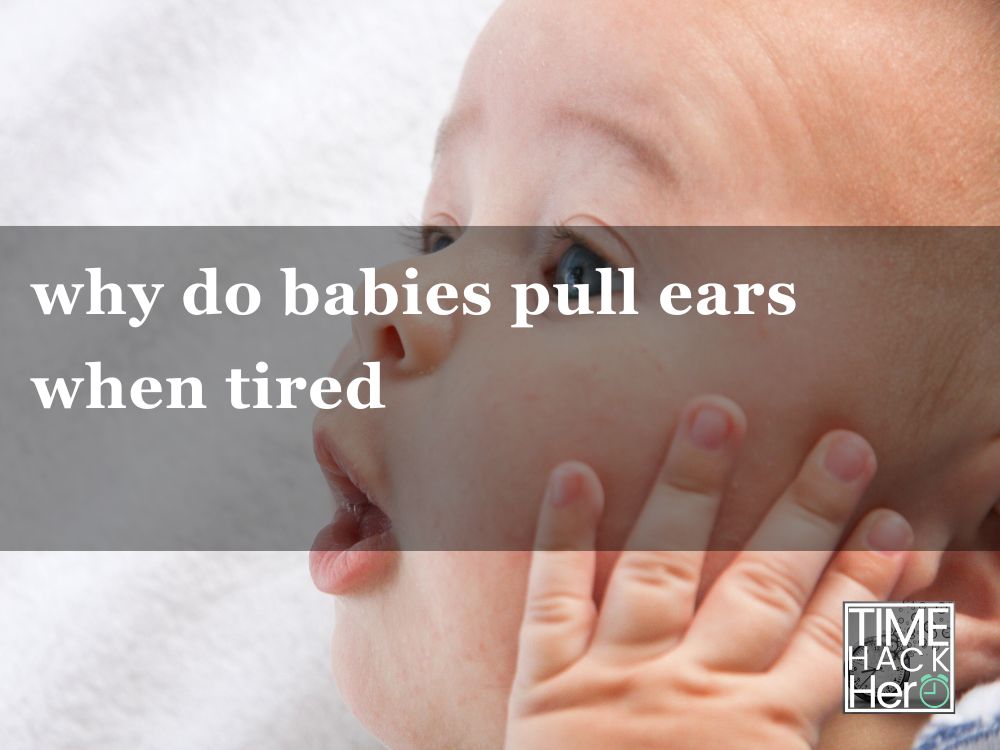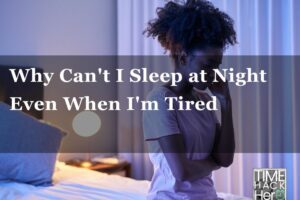It’s common for babies and toddlers to play with their ears by rubbing, pulling, or tugging on them. This harmless habit typically peaks when a child is tired or about to fall asleep. If you notice your little one pulling their ears often, especially before bed or during feeds, it usually does not indicate any problem. However, understanding the possible reasons behind this behavior can help you determine if your child needs comfort, rest, or medical attention.
Table of Contents
Is This Normal?
Ear pulling in babies is very common and generally not a cause for concern. According to research, over 50% of babies tug on their ears regularly. It most often appears between 3-12 months old and goes away on its own overtime.
Reasons why ear pulling is considered normal and harmless in infants:
- It is self-soothing and calming for the baby
- It does not cause any pain or distress
- It is not associated with ear infections
- Babies discover their body parts and enjoy playing with their flexible ears
- It helps relieve discomfort from minor ear irritation or teething
However, constant forceful ear pulling that seems painful or causes damage should be evaluated by a pediatrician. Sudden onset of ear pulling along with fever or behavior changes warrants medical assessment as well.
6 Reasons Why Babies Pull Their Ears
There are several theories about why babies commonly rub, tug, and play with their ears, especially when tired:
1. Self-Soothing
Gently manipulating the ears can be calming and soothing for babies. The repetitive motions are able to relax infants and lull them to sleep, like rocking or sucking a thumb.
2. Ear Discovery
Babies explore their bodies through touch. Grabbing and pulling their ears allows them to experiment with this new body part. The flexible cartilage makes ears fun to play with.
3. Minor Ear Discomfort
While not serious, some minor ear irritation can occur during teething as the jaw grows. Rubbing or pulling ears may relieve this minor discomfort.
4. Communication
Babies cannot verbalize needs and pull their ears to express tiredness, hunger, or general fussiness to caregivers.
5. Teething
Swollen, sensitive gums from emerging teeth may cause babies to tug on their ears which are located nearby on the head.
6. Ear Infection
Ear pulling is often assumed to signal an ear infection. However, research has not found a direct connection between increased ear pulling and ear infections in babies.
Effects of Baby Ear Pulling
When ear pulling is gentle and not excessive, it does not cause any harm or long term side effects in infants. However, in some cases problems can result:
- Skin irritation – Constant tugging can irritate the outer ear area.
- Infection – Scratches from fingernails can allow bacteria inside the ear canal.
- Damage – Forcefully pulling and twisting the ear can result in injury.
- Hearing loss – Chronic ear manipulation is associated with acquired hearing loss.
- Behavior problems – Repeated handling of ears can signal an underlying issue or need in the baby.
- Social issues – Some babies self-isolate and avoid social interaction while intently pulling their ears.
- Sleep disruption – Ear pulling that occurs at nap time or bedtime can interfere with sleep.
If ear pulling seems obsessive, painful, or is causing any physical effects, check in with your pediatrician. Otherwise, gentle ear tugging is considered harmless in babies.
When to Worry About Ear Pulling in Babies
Ear pulling on its own is not typically concerning, but may warrant medical evaluation if accompanied by:
- Fever, diarrhea, vomiting, or other signs of illness
- Redness, discharge, or bleeding from ears
- Crying or expressions of pain while pulling ears
- Damage to the ear such as scratches or bruising
- Changes in behavior such as increased fussiness
- Lasting ear fluid or signs of hearing difficulty
- No relief from ear pulling after sleep or feeding
- Pulling that increases in intensity or frequency over time
- Ear pulling that starts suddenly and is new behavior
If ear pulling remains constant and intense for several days or you notice any of the above accompanying symptoms, contact your pediatrician. Sudden onset of ear grabbing warrants prompt examination for infection.
Ways to Address Ear Pulling in Babies
If your baby is pulling ears frequently or intensely, here are some techniques to try:
- Identify and address possible sources of discomfort like teething. Use teething toys or pain relievers as recommended.
- Distract your baby by engaging them with toys, books, or songs when they grab their ears.
- Redirect your baby’s hands by gently holding their wrists and guiding them away from the ears.
- Offer a pacifier or let your baby suck on your pinky finger for self-soothing.
- Swaddle your baby to prevent uncontrolled arm movement near the ears.
- Play white noise or nature sounds to calm your baby when ear pulling occurs.
- Ensure your baby is getting enough tummy time and play. Increase supervised time on their belly if needed.
- Put socks over your baby’s hands at night to prevent ear grabbing if it affects sleep.
- Establish a soothing, consistent bedtime routine to help your baby wind down.
- Rule out ear infection, teething pain, or hunger if ear pulling arises during sleep or feeds.
When to Expect Ear Pulling to Resolve
As infants grow and gain self-regulation skills, harmless ear pulling behaviors tend to fade. Most babies stop regularly fiddling with their ears by the age of 2 or 3.
Here is a general timeline of when habitual ear pulling often diminishes:
- 6-12 months – Peak of self-soothing behaviors
- 12-18 months – Improved self-control and ability to self-settle without pulling
- 18-24 months – Rapid advancement in communication and regulatory skills
- 2-3 years – Confident self-regulation and sensory exploration in most toddlers
If forceful ear pulling persists much beyond age 2, check with your pediatrician to rule out the possibility of developmental delays or sensory issues.
Teaching Healthy Sleep Habits
Parents can help infants learn to self-settle without needing to pull their ears repetitively. Establishing a calming bedtime routine with transitional objects can be beneficial.
Here are some tips for encouraging healthy sleep habits:
- Maintain a consistent evening schedule – Follow the same sequence of bath, massage, pajamas, story, song, etc. to signal rest time.
- Create a peaceful sleep environment – Use a sound machine, dark curtains, and a cool, quiet room to promote sleepiness.
- Allow infant to self-soothe to sleep – Rather than rocking until fully asleep, put baby down drowsy but awake.
- Introduce a sleep association object – A special stuffed animal, blanket, or music can soothe infants.
- Be attentive during awake time – Meet physical and emotional needs promptly so baby feels secure.
- Check on, but don’t rush to pick up – For night wakings, wait to see if the baby can resettle independently.
Following healthy sleep habits can help reduce infant sleep struggles and the need to self-soothe through ear pulling. If an ear pulling habit persists beyond toddlerhood, or seems connected to anxiety, seek pediatric guidance on setting your child up for sleep success.
Conclusion
Babies grabbing, rubbing, and tugging their ears is very common between 3-12 months old, especially when tired or trying to sleep. While this habit can concern parents, gentle ear pulling is generally harmless and outgrown overtime as self-soothing behavior. However, painful or obsessive ear pulling or pulling combined with other symptoms warrants medical assessment for infection or another issue. With patience and attentive caregiving, harmless ear pulling should resolve on its own as your baby grows.
Frequently Asked Questions
Why does my baby keep pulling their ear?
Common reasons babies pull their ears include self-soothing, exploring their body parts, minor ear discomfort from teething, signaling needs to parents, and ear infections. Most often, babies pull their ears when tired or sleepy.
Should I worry if my baby pulls ears a lot?
Frequent ear pulling alone is not worrisome if it seems painless and causes no damage. However, persistently forceful pulling, sudden increases in frequency, accompanying fever or behavior changes, ear injury, and other symptoms should be evaluated medically.
Do ear infections cause babies to pull ears?
Despite common belief, research has not found a direct link between ear infections and increased ear pulling in babies. While infection can cause ear discomfort, babies do not necessarily pull on infected ears more than uninfected ones.
Does ear pulling affect hearing?
Chronic forceful ear pulling and manipulation is associated with acquired hearing loss in babies. The cause is likely mechanical stress and damage over time. Gentle, occasional ear tugging does not affect hearing. Excessive pulling should be evaluated.
How do you stop a baby pulling their ears?
To curb harmless ear pulling, distract your baby with toys, redirect their hands, meet their needs like hunger/discomfort, use sound machines and swaddling at bedtime, allow plenty of play time, and establish soothing routines. Seek medical guidance if ear pulling seems abnormal.









